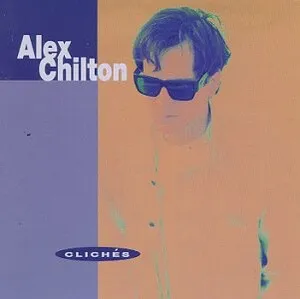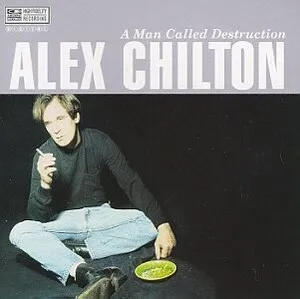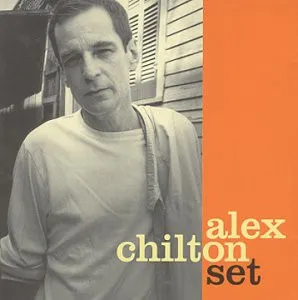Alex Chilton's '90's solo albums
Continuing our focus on the late Alex Chilton’s obscure and rare solo recordings, we now turn our attention to the three solo albums that Chilton recorded in the ‘90’s. Those albums are Clichés (1994), A Man Called Destruction (1995), and Set (2000). (Chilton also released an album called 1970 -- which was recorded that year -- during the '90's. A review of that album is here).
Clichés is a collection of 12 gentle acoustic numbers performed in the studio by Chilton alone. (Although it has been reported that the album was recorded in a single evening, Chilton was quoted as saying that it actually took a number of sessions). Eleven of them are covers of old songs originating from the 1920’s through 1950’s, from such performers as Nina Simone, Nat King Cole, Chet Baker, and Ray Charles. There’s also a brief instrumental based on Johann Sebastian Bach’s “Gavotte”. Chilton does well with all of the selections, and seems more focused on his singing and playing than he had in many a moon. Clichés is decidedly not the average Box Tops or Big Star fan’s cup of tea, but the warm and intimate approach reveals a side of Chilton’s talent and musical interests that he had never shown before. Mel Tormé’s “Christmas Song” and Buddy Johnson’s “Save Your Love For Me” are the tracks with the most immediacy. (2/9/19 Update: In February 2019, a compilation titled Songs From Robin Hood Lane was issued by the Bar/None label, containing five tracks from Clichés and different recordings of three other selections ("Save Your Love For Me", "There Will Never Be Another You", "Time After Time") which were previously unreleased. For Record Store Day in 2024, Bar/None will reissue Clichés on vinyl in a 900-copy limited edition).
By contrast, Chilton recorded A Man Called Destruction with the help of several supporting musicians, and placed six originals among the covers. (A Man Called Destruction was Chilton’s only post-1989 solo album to feature new Chilton compositions; two of them – “It’s Your Funeral” and “Boplexity” – are instrumentals). Not surprisingly, the Chilton compositions generally tend toward the type of rockabilly sound that was common on Chilton’s solo albums. The exception is “It’s Your Funeral”, which is derived from Frédéric Chopin’s funeral march. Although Chilton still does not acknowledge his past exploits with Big Star, his rendition of Daniel Pearson’s 1978 r&b ballad “What’s Your Sign Girl” could pass for a sequel to Big Star’s “September Gurls”. He sounds as lively as he ever did on his cover of Adriano Celentano’s fast-paced Italian classic “Il Ribelle”. And his cover of “New Girl In School”, a song Brian Wilson penned for Jan and Dean in 1964, is as charming as it is anachronistic. For an album that roams all over the musical map, A Man Called Destruction is a remarkably stable set. It’s one of Chilton’s more accessible solo works, though it still won’t appeal to all tastes.
The same can probably be said for Set, which Chilton recorded during a single evening in February 1999 with bassist Ron Easley and drummer Richard Dworkin. (The album was released that year in Europe under the vulgar title Loose Shoes and Tight P****, which is based on an obscene remark reportedly made by Earl Butz in the ‘70’s). It covers some of the same ground as Clichés with its covers of old jazz selections (even containing a different, snappier version of Chet Baker’s “There Will Never Be Another You”), and also features covers of r&b tunes from later decades (the newest one being Ollie Nightingale’s unique 1996 number “You’ve Got a Booger Bear Under There”), and Gary Stewart’s 1978 country song “Single Again”. The use of a basic rock combo and a one-take recording technique give the songs a bar-band-like spontaneity. Of course, this was the type of spontaneity that Chilton was comfortable with – and excelled at – by this time. For example, his version of Brenton Wood’s “Oogum Boogum” sounds surprisingly good for a one-take recording. Chilton’s vocals sometimes sound strained, but he is in good form here as a guitarist. There will indeed never be another Alex Chilton, and Set is another good souvenir to keep as a reminder of this talented, independent musician who did things his own way.

Alex Chilton “Clichés” (Ardent 7-1506-2) 1994
Track Listing:
1. My Baby Just Cares For Me
2. Time After Time
3. All Of You
4. Gavotte
5. Save Your Love For Me
6. Let’s Get Lost
7. Funny (But I Still Love You)
8. Frame For The Blues
9. The Christmas Song
10. There Will Never Be Another You
11. Somewhere Along The Way
12. What Was

Alex Chilton “A Man Called Destruction” (Ardent 7-1507-2) 1995
Track Listing:
1. Sick and Tired
2. Devil Girl
3. Lies
4. It’s Your Funeral
5. What’s Your Sign Girl
6. Il Ribelle
7. You Don’t Have To Go
8. Boplexity
9. New Girl In School
10. You’re Lookin’ Good
11. Don’t Know Anymore
12. Don’t Stop

Alex Chilton “Set” (Bar/None AHAON-110) 2000
Track Listing:
1. Never Found A Girl
2. Lipstick Traces
3. Hook Me Up
4. Oogum Boogum
5. You’s A Viper
6. I Remember Mama
7. April In Paris
8. There Will Never Be Another You
9. Single Again
10. You’ve Got A Booger Bear Under There
11. Shiny Stockings
12. Goodnight My Love
Clichés is a collection of 12 gentle acoustic numbers performed in the studio by Chilton alone. (Although it has been reported that the album was recorded in a single evening, Chilton was quoted as saying that it actually took a number of sessions). Eleven of them are covers of old songs originating from the 1920’s through 1950’s, from such performers as Nina Simone, Nat King Cole, Chet Baker, and Ray Charles. There’s also a brief instrumental based on Johann Sebastian Bach’s “Gavotte”. Chilton does well with all of the selections, and seems more focused on his singing and playing than he had in many a moon. Clichés is decidedly not the average Box Tops or Big Star fan’s cup of tea, but the warm and intimate approach reveals a side of Chilton’s talent and musical interests that he had never shown before. Mel Tormé’s “Christmas Song” and Buddy Johnson’s “Save Your Love For Me” are the tracks with the most immediacy. (2/9/19 Update: In February 2019, a compilation titled Songs From Robin Hood Lane was issued by the Bar/None label, containing five tracks from Clichés and different recordings of three other selections ("Save Your Love For Me", "There Will Never Be Another You", "Time After Time") which were previously unreleased. For Record Store Day in 2024, Bar/None will reissue Clichés on vinyl in a 900-copy limited edition).
By contrast, Chilton recorded A Man Called Destruction with the help of several supporting musicians, and placed six originals among the covers. (A Man Called Destruction was Chilton’s only post-1989 solo album to feature new Chilton compositions; two of them – “It’s Your Funeral” and “Boplexity” – are instrumentals). Not surprisingly, the Chilton compositions generally tend toward the type of rockabilly sound that was common on Chilton’s solo albums. The exception is “It’s Your Funeral”, which is derived from Frédéric Chopin’s funeral march. Although Chilton still does not acknowledge his past exploits with Big Star, his rendition of Daniel Pearson’s 1978 r&b ballad “What’s Your Sign Girl” could pass for a sequel to Big Star’s “September Gurls”. He sounds as lively as he ever did on his cover of Adriano Celentano’s fast-paced Italian classic “Il Ribelle”. And his cover of “New Girl In School”, a song Brian Wilson penned for Jan and Dean in 1964, is as charming as it is anachronistic. For an album that roams all over the musical map, A Man Called Destruction is a remarkably stable set. It’s one of Chilton’s more accessible solo works, though it still won’t appeal to all tastes.
The same can probably be said for Set, which Chilton recorded during a single evening in February 1999 with bassist Ron Easley and drummer Richard Dworkin. (The album was released that year in Europe under the vulgar title Loose Shoes and Tight P****, which is based on an obscene remark reportedly made by Earl Butz in the ‘70’s). It covers some of the same ground as Clichés with its covers of old jazz selections (even containing a different, snappier version of Chet Baker’s “There Will Never Be Another You”), and also features covers of r&b tunes from later decades (the newest one being Ollie Nightingale’s unique 1996 number “You’ve Got a Booger Bear Under There”), and Gary Stewart’s 1978 country song “Single Again”. The use of a basic rock combo and a one-take recording technique give the songs a bar-band-like spontaneity. Of course, this was the type of spontaneity that Chilton was comfortable with – and excelled at – by this time. For example, his version of Brenton Wood’s “Oogum Boogum” sounds surprisingly good for a one-take recording. Chilton’s vocals sometimes sound strained, but he is in good form here as a guitarist. There will indeed never be another Alex Chilton, and Set is another good souvenir to keep as a reminder of this talented, independent musician who did things his own way.
Alex Chilton “Clichés” (Ardent 7-1506-2) 1994
Track Listing:
1. My Baby Just Cares For Me
2. Time After Time
3. All Of You
4. Gavotte
5. Save Your Love For Me
6. Let’s Get Lost
7. Funny (But I Still Love You)
8. Frame For The Blues
9. The Christmas Song
10. There Will Never Be Another You
11. Somewhere Along The Way
12. What Was
Alex Chilton “A Man Called Destruction” (Ardent 7-1507-2) 1995
Track Listing:
1. Sick and Tired
2. Devil Girl
3. Lies
4. It’s Your Funeral
5. What’s Your Sign Girl
6. Il Ribelle
7. You Don’t Have To Go
8. Boplexity
9. New Girl In School
10. You’re Lookin’ Good
11. Don’t Know Anymore
12. Don’t Stop
Alex Chilton “Set” (Bar/None AHAON-110) 2000
Track Listing:
1. Never Found A Girl
2. Lipstick Traces
3. Hook Me Up
4. Oogum Boogum
5. You’s A Viper
6. I Remember Mama
7. April In Paris
8. There Will Never Be Another You
9. Single Again
10. You’ve Got A Booger Bear Under There
11. Shiny Stockings
12. Goodnight My Love
Comments
He also explained the genesis of the album, which was recored year and a half after he'd done a short tour of Belgium playing solo acoustic sets alongside seven singer-songwriters (the others being Townes Van Zandt, Guy Clark, Eric Andersen, David Olney, Pat Mears, Paul K & Tom Pacheco). Speaking of the tour, he told Spera:
"It was something I really hadn’t done too much, but I sort of enjoy doing it. When I was putting together my repertoire for that, it seemed to me that the best thing I could do was to play these kind of jazzy things. Trying to be like a folk singer or sing country blues didn’t feel as right as doing this kind of jazzy thing.
So maybe a year later, the woman who had booked the tour over there was working with some record companies over there, and called me up and said she wanted me to make a solo record for this label she was working with. I thought about it for a couple of days, and thought about all of those tunes, and thought, “Yeah, I can flesh that into an album.” I ended up making it for this French company instead, New Rose, and then licensed it to Ardent after they had heard it and really dug it. It was proposed to me, and there was some money involved, and I said, “Well, I can use that money, and I think I can do a good record.”
Spera, Keith (May 1, 1995). "Alex Chilton Lets Them Scream". OffBeat Magazine. OffBeat Magazine.